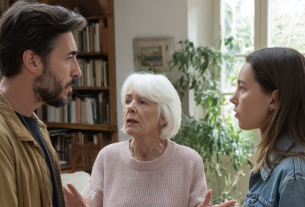— They say that hospital walls intensify love. Apparently, our case is different,” the wife said bitterly.
“— I’ve always been honest with you, Ira,” her husband immediately replied.
Sunlight shattered through the blinds, painting stripes on the pale green wall of the ward. Between these stripes, the shadows of the IV pole and medical devices froze—a ridiculous geometry of illness.
“— Honest? An interesting interpretation of infidelity and lying,” the woman lying on the bed replied with a wry smile while brushing a stray lock of hair. “Especially now, when you’ve decided that I’m dying.”
Outside the hospital, the spring evening roared. The buds of poplar trees burst, throwing out sticky little leaves into the April air. Nature was renewing itself, shedding the old, preparing for new life. Meanwhile, in the intensive care ward, the final act of a fifteen-year marital drama was unfolding.
Through a half-open window, the voices of nurses laughing somewhere in the smoking room could be heard, along with the rustling of tires on wet asphalt and the shouts of children from the nearby playground. The world went on, oblivious to the small tragedy in a standard hospital room.
“— You’ve always loved to exaggerate,” the husband said as he walked across the ward, his reflection flickering in the chrome surfaces of the IV pole. “I’m taking care of our future, of our family.”
In the corner of the room, a monitor flashed its red eye, counting the beats of the heart of the pregnant woman. Every beep was like a timestamp, marking the minutes of this strange visit.
“— Family? When you’re busy delivering papers to re-register our apartment and summer house? When you find out that your wife is dying from complications of pregnancy? Is that taking care of the family?” Ira tried to sit up, but the IV line tightened, painfully tugging at her vein.
The plastic blinds rattled in a gust of wind. An eerie silence settled over the ward—the kind that comes before a storm, when the air vibrates with tension and every sound seems sharper and clearer.
“— Don’t dramatize. I’m just thinking rationally ahead. The situation is critical, the doctors say…”
“— The doctors say I’m at risk of premature labor, not that I’m doomed to death!” her voice broke off mid-sentence. “You got the wards mixed up, Oleg. It’s Ira Volkova from the second therapy that is dying. A namesake. But you didn’t bother to clarify, did you?”
The man froze; his face twitched as if all the muscles of his face had suddenly let go. The hand holding the folder of documents drooped listlessly.
“— I… I don’t understand.”
“— Of course you don’t understand,” the woman slowly exhaled, watching how her husband’s expression changed—from compassionate and businesslike to bewildered. “They told you that Ira Volkova is in critical condition. You rushed in with documents for the re-registration. Not with flowers, not with support—but with papers for my apartment. For the summer house I bought with the fee from my last screenplay.”
Outside, a flock of sparrows ascended above the windowsill, disturbed by something unseen. Their shadows danced on the ward’s wall—lively, swift, free.
“— You’ve misunderstood everything,” the man said as he put the folder on the bedside table and tried to take his wife’s hand. “I was really worried, but I was also thinking of our future. Of our child.”
“— Of ‘our’ future? When I told you I was pregnant—you proposed an abortion. You said we couldn’t handle a second child, that you were thirty-seven, and you weren’t ready to change diapers again.”
The instruments continued to monotonously record the heartbeat. The drip of the IV was like a metronome on the edge of consciousness, marking the final minutes of their marriage.
“— That was a moment of weakness, I later changed my mind.”
“— After I told you that I would give birth with or without you. And that from my parents’ inheritance you’d get nothing if you left your pregnant wife. It’s amazing how quickly some men change their opinions,” she replied bitterly.
The hospital room resembled a theatrical stage—with decor made up of medical equipment, with the precisely measured light of the April sun, and with two actors playing their final roles in this family drama.
“— You know what’s the funniest?” Ira looked out the window, where on a poplar branch a bird feeder swayed. “I really thought you’d changed. That when you returned after that affair three years ago, you had become a different man.”
“— I have changed!” the man almost shouted. “I’m with you, I care about us. All this time…”
“All this time I was paying the mortgage. I paid off the loan for your car. I bought groceries. I paid for Misha’s private school. And what were you doing?”
The spring wind grew stronger; the curtains billowed like a sail. From a neighboring building came the sounds of renovation—a dull hammering, the grinding of a drill. Someone was building their future, while in this room the past was crumbling.
“— I was working! You know very well that small business is unstable right now. My projects…”
“— Your projects exist only in your head,” Ira grimaced in pain as she felt her stomach tighten. “In fifteen years of marriage you haven’t completed a single one. A travel agency, a construction company, seafood export, investments in startups—and all on my money. Everything has failed.”
The man approached the window; his silhouette was clearly outlined against the setting sun. His shoulders slumped, as if all his old bravado had suddenly bled out.
“— You never really believed in me.”
“— On the contrary. I believed for too long. Too much. Even when I found your correspondence with that woman. Even when you went to live with her for half a year. Even when you came back because she wouldn’t pay for your ‘business plans’.”
Somewhere down the corridor an alert sounded; the rapid footsteps of the medical staff could be heard. Someone’s life was being decided just beyond the door of this ward, while here a marriage was dying.
“— You always accused me of spending money,” the man’s voice sounded low. “Always.”
“— No, you were the one always taking it. On your business, on development, on a new idea. And I preferred not to notice how it disappeared, never appearing as profit or as gratitude.” She glanced at her stomach, encased in her hospital gown. “You know what I was doing these last two months besides shooting a TV series? Checking our accounts. It turned out you had withdrawn almost all the money from the joint account.”
The man abruptly turned, his face contorting:
“— Those are our joint funds! I have a right to them.”
“— Of course. Just as I have the right to know where more than half the family budget is going. I checked. You’ve got an apartment for rent in Chistye Prudy. You regularly order food for two. You often buy women’s cosmetics and size 42 lingerie. I wear 46, in case you forgot.”
Outside, the sound of an ambulance siren flashed past, momentarily tinting the ward’s walls in red and blue, like police lights at the scene of a crime. A crime spanning fifteen years.
“— This is for you! For the holidays!” His voice sounded as false as a poorly tuned instrument.
“— Don’t trouble yourself. The Tinder chat still has one account. Your password hasn’t changed since our wedding—the name of your childhood dog and your year of birth.”
It would seem that everything in the ward should have changed with those words—but it did not. Everything remained the same: the same white walls, the same monotonous beeping of the machines, the same IV drip. Only something invisible that had held them together all these years finally snapped.
“— I can explain everything,” the man finally said. “It’s a complicated period in my life, I got confused, but I love you and our son…”
“— No. You don’t love me. You love the comfort I provide you. The apartment I bought with my screenplay fees. The summer house inherited from my parents. The money I earn from my scripts.” She looked her husband straight in the eyes. “But you know what’s the funniest? Until today I didn’t admit it to myself that it was so. I thought: he’s here, he’s trying, trying to set up a business…”
Down the corridor a gurney clattered, someone issuing loud commands. Life in the hospital continued its pace—indifferent to the personal dramas of individual patients.
“— And it turned out, a mix-up with a namesake was enough for you to rush in—not to support your dying wife, but to seize her property! It’s even funny.”
The monitor registered an accelerated heartbeat. The medical devices impassively noted how emotional tension was reflecting on the physical state of the pregnant woman.
“— Ira, listen,” the man tried once more to approach the bed. “You’re under the influence of hormones. You can’t afford to get upset now. Let’s postpone this conversation…”
“— So that you have time to come up with a new lie?” She turned away to the window. “You know what I realized, lying here and looking at the ceiling? I’m strong. I’m talented. I can take care of myself and the kids. I don’t need a man who only sees me as a wallet and a convenient cover for his affairs.”
Outside, the April twilight deepened. The hospital park gradually surrendered to darkness, with only street lamps outlining the paths with yellow circles of light. Somewhere far away, music played—someone had turned on the radio in their car.
“— You can’t do this,” the man’s voice grew harsher. “We have a family, a son, a mortgage…”
“You weren’t there when I got my diagnosis. You weren’t there when I was afraid of losing my child. You weren’t there when Misha fell ill with the flu and had a temperature of forty degrees,” her voice sounded remarkably calm. “I think you’ll manage to cope with your absence. Only now it will be official.”
The IV steadily measured its drops. Beyond the door, one could hear the footsteps of nurses, quiet conversations, the squeak of a medicine cart. The hospital lived its own measured life, and in room 318 a new woman was being born.
“— You’ll regret this,” the man whispered, picking up the folder of documents. “When the hormones subside, you’ll realize that you made a mistake.”
“— Perhaps. But it will be my mistake. Not one imposed on me, not dictated by others’ interests. My own, hard-earned mistake.”
Ira closed her eyes and let silence embrace her. The monitor continued to count heartbeats—now a little calmer.
“— You won’t be able to do without me,” the man’s final desperate card slipped from his lips. “Who will help with the kids? With this new child? Do you think it’s that simple?”
Ira opened her eyes and allowed herself a slight smile:
“— And you know, for several months I’ve been doing just fine on my own. With work, with Misha, and with my pregnancy.”
Oleg stepped toward the door but stopped, as if hoping for an unexpected twist in the story. But the script was already written—not by him.
“— Tomorrow I’ll send you the contact details of my lawyer,” Ira said, her voice unexpectedly soft. “The divorce process doesn’t have to be a war. Take your things within a week. Leave the keys with the concierge.”
The man stood clutching the folder of documents. His face gradually hardened, turning into a mask of wounded pride.
“You’ll remember my words,” he said at last, abruptly opening the door.
A gust from the corridor stirred the curtain. The door slammed shut, leaving Ira alone with the silence and the steady beep of the monitor.
She slowly exhaled and placed a hand on her belly. A slight movement inside caused a wave of tenderness to wash over her.
“— It’s going to be all right, baby,” she whispered. “We’ll manage.”
At that moment the door opened again. Ira tensed, bracing herself for another exhausting conversation. But instead of Oleg, a disheveled ten-year-old boy with a backpack over his shoulder peered into the ward.
“— Mom!” Misha rushed to the bed, carefully embracing his mother. “I ran away after the last lesson, when Aunt Sveta said you were in the hospital!”
Behind him appeared a breathless woman of middle age—a neighbor and longtime friend of Ira.
“— I’m sorry, I couldn’t keep him in check,” she explained with her hands spread. “He clung to me like a tick until I brought him here.”
Ira embraced her son, inhaling the scent of his hair—a mix of shampoo, child sweat, and some inexplicable apple aroma.
“— I was worried,” Misha said seriously as he stepped back to examine his mother. “How are you? How’s the little one?”
“— How do you know there will be a girl?” Ira smiled.
“— I just know,” the boy shrugged with the certainty only a child can have. “Yesterday I made a paper boat for her. And one for you, too.”
He rummaged in his backpack and produced two paper boats—a big one and a small one, colored with markers.
“— It’s so that you’ll both sail home as soon as possible,” he explained, gently placing the boats on the bedside table.
Ira felt a lump in her throat. She caught the glance of her friend standing in the doorway. Sveta merely nodded ever so slightly, as if confirming the unspoken message: “See, everything will be all right.”
“— And where’s dad?” Misha suddenly asked, surveying the ward. “I thought he’d be here, too.”
Ira realized with a calm determination that she felt neither bitterness nor pain. Only quiet resolve.
“— Dad left on business,” she answered, looking him straight in the eyes. “We need to talk seriously about this, but not now, all right?”
Misha looked at his mother attentively and then said:
“— He’s not going to live with us anymore, is he?”
There was neither blame nor fear in his voice—only understanding, remarkable for a child his age.
“— Where did you…?” Ira began.
“— I know everything, Mom,” the boy shrugged. “He’s always off somewhere. And you hardly talk to each other. And I saw him checking out another lady.”
Ira exchanged glances with her friend. Sveta just spread her arms, as if to say that children see much more than adults think.
“— We’ll manage,” Misha suddenly declared, echoing the very words Ira had just whispered to her unborn child. “Me and my little sister will help you.”
He nodded in a grown-up manner, affirming his promise, then suddenly smiled, returning to being just a little boy:
“— And can I teach her how to ride a bicycle? And roller skate? And show her the stars?”
Ira drew her son close, embracing him with one arm while tenderly touching her belly with the other.
“— Of course, you can,” she whispered. “Everything is possible.”
Outside, the dusk deepened. Clouds drifted across the darkening sky, highlighted by the setting sun. Far away, the first spring thunder rumbled, promising cleansing and renewal.
Peace reigned in the ward. The paper boats on the bedside table seemed to symbolize a new journey—challenging, yet real. Sveta quietly left, leaving the mother and son together, while the monitor continued to count the heartbeats—now steady and strong.
The hospital walls had indeed heightened Ira’s feelings. Only not the ones her husband had expected. They helped her see not a dying love, but a love reborn in freedom.



